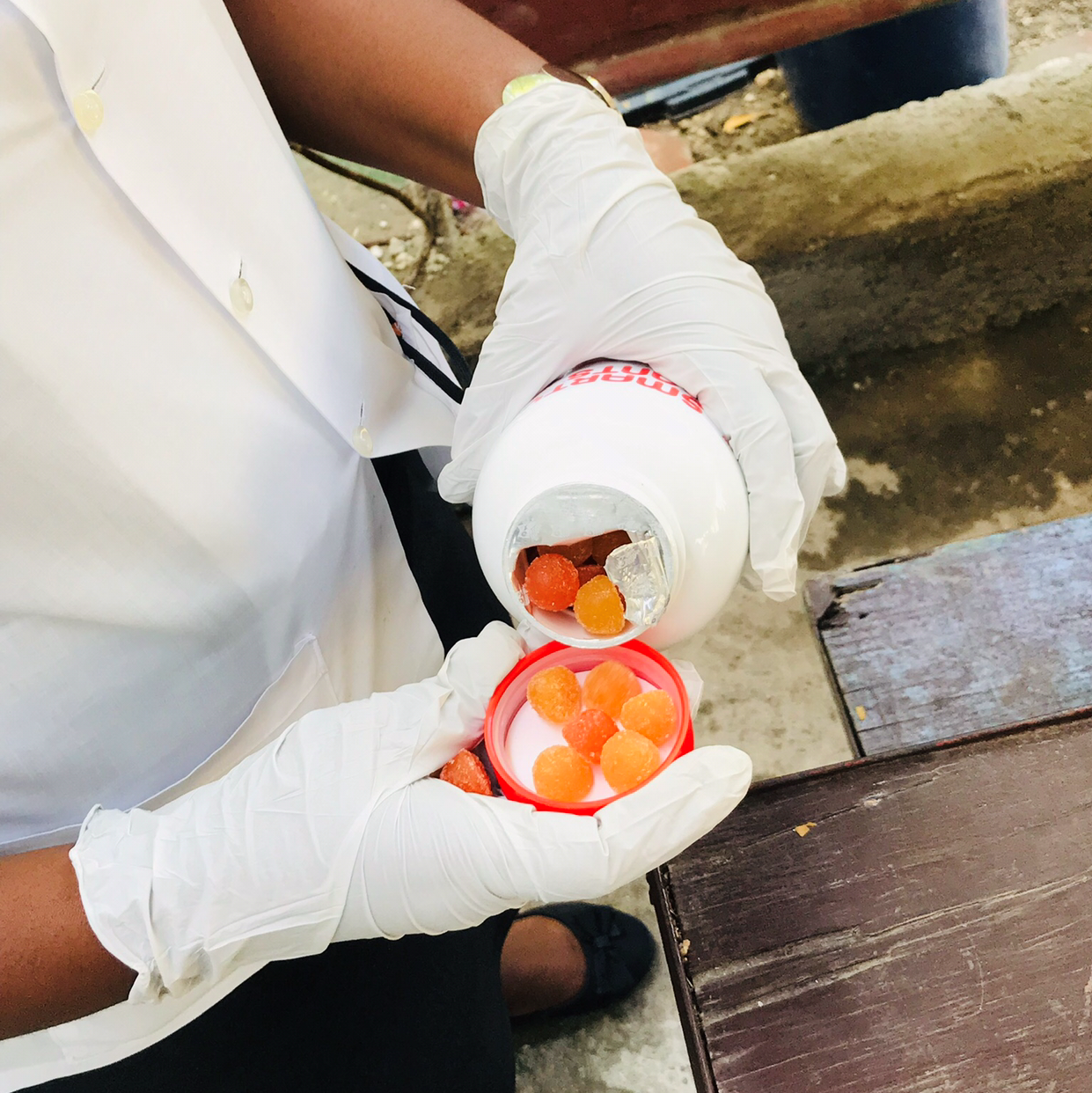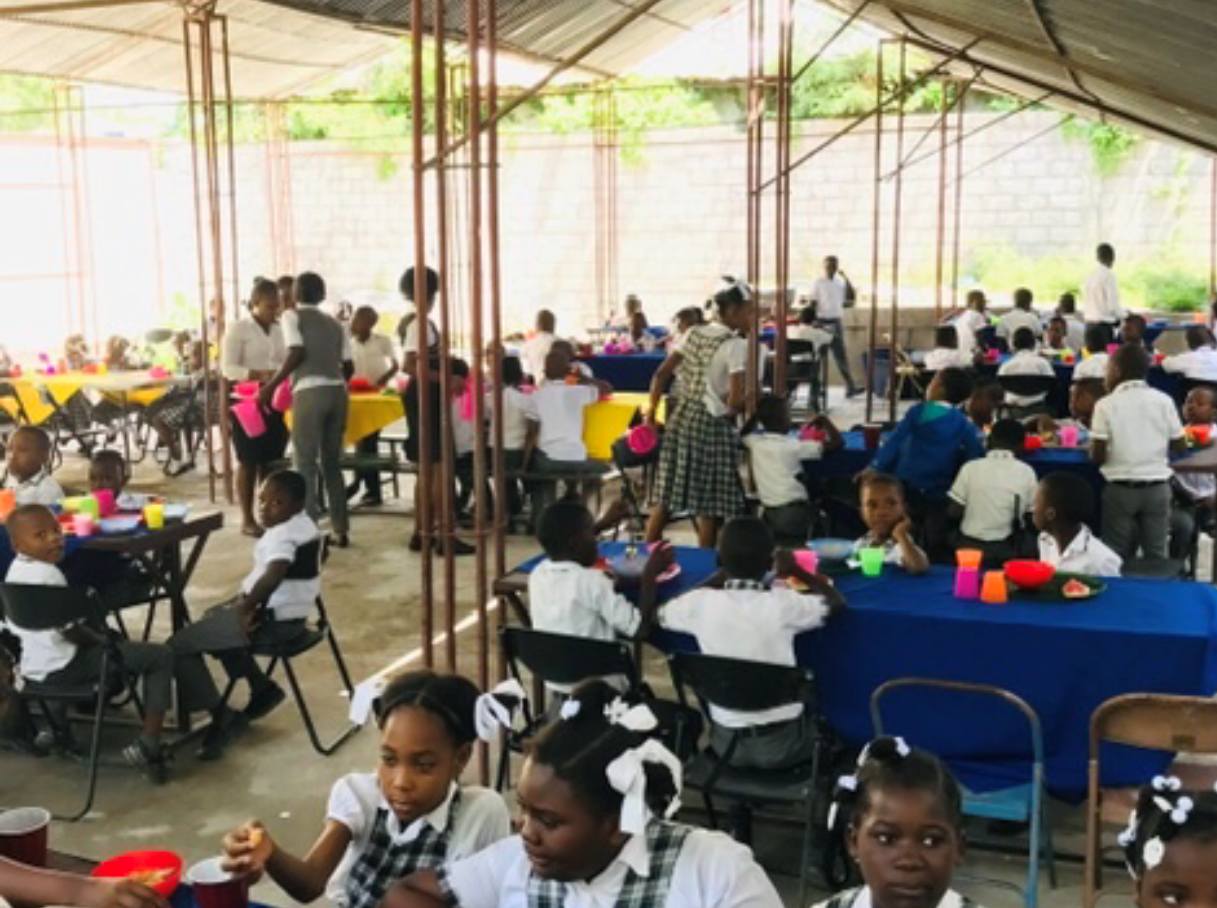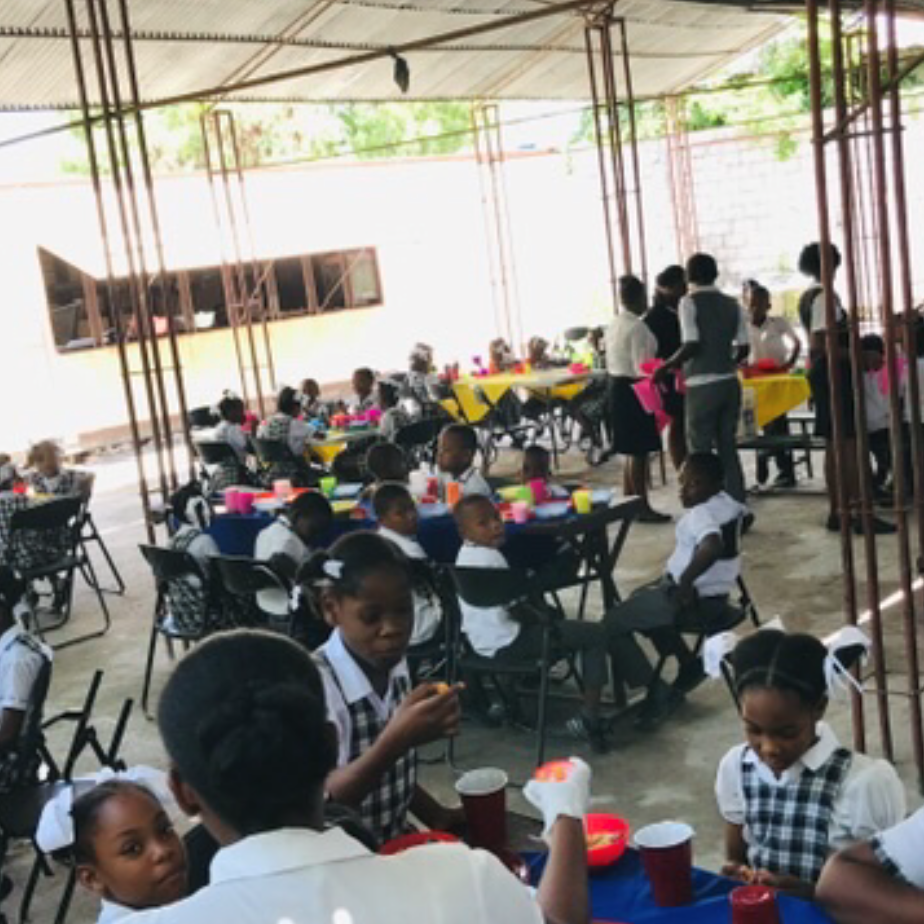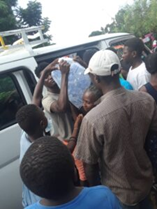CONASPEH Projects
Haiti
Click here to see the latest update
Read CONASPEH’s Vision and Mission Document from May 2014
CONASPEH provides a variety of life-giving ministries in Haiti. CONASPEH has an Adult Literacy program to confront the low percentage of adult literacy. They focus on education at all levels including Andrew Theological Seminary. CONASPEH also runs a medical ministry to reach individuals in rural provinces, provides economic programs which offers savings and loan opportunities, as well as an emergency response ministry to provide accompaniment during emergencies.
Earthquake Update: 2011
The National Spiritual Council of Churches of Haiti (CONASPEH) continues in Development and Reconstruction from the January 12, 2010, earthquake. In a recent visit by Reverend Patrick Villier, President of CONASPEH, and submitted report, CONASPEH conveys its deep appreciation for the partnership with the United Church of Christ and the Christian Church (Disciples of Christ) through Global Ministries. For CONASPEH, this partnership has been a source of strength in the recent years, just as it had been before the earthquake
The second new building constructed after the earthquake, the Classroom Building on the CONASPEH grounds, is nearing completion with the dedication set for late summer, 2012. As shared previously, it is being built on an area of a bit more than 18,000 square feet. The building has two floors with classrooms. The student capacity is 1300. The building includes an open-air auditorium to seat 1,000 people. The auditorium has a roof but open walls. In addition to its uses in CONASPEH programs such as training of seminarians, graduations, conferences, and other events, the auditorium will also be available to CONASPEH churches when they have an event.
The Classroom Building also includes laboratories for languages, physics, chemistry, and computer science. The library will include materials in three sections: the K-12 school, the theological seminary, and the nursing school. The building includes a water reservoir and restrooms. The Classroom Building is built of steel and concrete and constructed to withstand earthquakes and high winds. This building design called for a ratio of 80 percent iron and 20 percent concrete in its construction materials. The steel structure is anchored into the ground and will never exceed two stories high.
Until the Classroom Building is fully complete and in use, the first new building built after the earthquake and inaugurated in February, 2011, continues to house elements of the nursing school and theological seminary. This first building eventually will serve as offices, a welcome center, meeting areas, and storage.
CONASPEH continues to re-equip its facilities and programs with the materials and resources vital to their functioning and to purchase supplies needed as their mission continues to grow and evolve. One major project is to re-stock the library, as only 2,000 books remained after the earthquake. Texts for the K-12 school, theological seminary, Karen School of Nursing, and skills-training courses in computation, refrigeration, and language are being acquired. In recent months, 60 computers have been purchased and the chemistry lab is being equipped for use by both high school students and nurses. A diesel generator also has been purchased in order to provide electrical power on a consistent basis.
CONASPEH’s Vocational School is set to begin in the fall. Vocational students will learn construction skills using steel. A welding machine and basic equipment have been obtained. There is much building and re-building yet to be done throughout Port-au-Prince and Haiti in general and those who can receive training through the vocational school will be at an advantage for potential jobs. The Vocational School certificate is the equivalent of a high school education. There already are 100 students enrolled to begin in the fall vocational training course. CONASPEH plans to offer shifts of classes each day, one in the morning and another in the evening, to maximize the number of students who can enroll. These students will also have classes in improving their literacy, computer skills, and English.
One of the essential purchases for CONASPEH’s work and their welcoming of pilgrimage groups to Haiti was the addition of two vehicles. CONASPEH had planned toward the purchase of these vehicles since shortly after the earthquake and it is very exciting to finally be able to acquire them. The mini-bus, which will be vital to the ministry of groups visiting CONASPEH from the U.S. and elsewhere, has been purchased and is anticipated in mid-June, 2012. The second vehicle envisioned for their work was a smaller utility vehicle, such as an extended cab pickup or a SUV, for the CONASPEH leadership and mission staff to reach remote churches. Until these vehicles were purchased, CONASPEH rented vehicles to meet these needs.
CONASPEH continues to administer a Mutual Support Program through UNICEC, a co-op and credit union organization with experience in the administration of micro-loans, project assessment, and grassroots education for co-op members taking out micro-loans for small business efforts. In addition to administering loans in Port-au-Prince, UNICEC also works with CONASPEH in Jacmel, Artibonite, and Les Cayes. CONASPEH has a committee, made up primarily of young pastors with experience in cooperatives that works with Lumicec in the analytical, educational, and administrative portions of the program. Loan interest rates are about three percent. Lumicec receives two percent for their administration of the program and CONASPEH receives the remaining one percent to reinvest in ongoing ministries. The Mutual Support Program has three aspects.
- Micro-loans to families affected by the earthquake. In order to rebuild the grassroots economy in Haiti, loans of up to $500 are being made to families to allow them to start income-generation projects. Lumicec assesses the viability of the project, trains the families in small-business management, and monitors the projects and repayment of the loans. The loans are being paid back in a period of six to 12 months. Loans also are used to help families move to more stable housing. Families are identified for support by CONASPEH member church pastors and leaders as being in most need and with capacity to carry out the projects successfully.
- Aid and Micro-loans to persons disabled by the earthquake, the traumatized, and their families. CONASPEH, through Lumicec, provides a combination of financial aid and loans for amputees and others who were disabled by the earthquake along with their families. The funds go toward medical attention and rehabilitation; loans go to help the families rebuild their economic livelihoods.
For families who have been traumatized through the loss of a family member, CONASPEH continues to offer pastoral support and trauma recovery through a CONASPEH Pastoral Committee.
- Revolving Fund to rebuild destroyed and damaged CONASPEH Member Church Buildings. CONASPEH established a revolving fund which provides loans up to $1,200 to local churches that are ready to rebuild their buildings, which also function as schools, worship centers, community centers, and/or clinics. These loans will be repaid in a period of one to three years at a very low percentage rate.
Since the earthquake, CONASPEH has sought out options for a Center for Transformation to house visiting groups, CONASPEH pastors, and other smaller gatherings of people central to the life and work of CONASPEH. A deeded property adjacent to the CONASPEH property is being purchased and a building will be constructed there. The plan is for an open-concept building with dormitory, kitchen, dining/meeting area, and restrooms. It will be a one story structure with a steel framework similar to other new buildings being built by CONASPEH. Twenty bedrooms, each outfitted to house several guests, are planned for the structure and additional space to house a Haitian administrator and a global mission staff person. The name for the center is the Ferdinand Garcia Transformational Center, named for a long-time Disciple friend and supporter of CONASPEH who died in 2003. It is recognized that this Center will be a place of hospitality and for participants to discuss, reflect, and to be transformed. CONASPEH’s partnership with Global Ministries has brought the transformation of many people both from Haiti and from the U.S./Canada. Having a space of sharing cultures, concerns, and faith will allow all to know and to serve each other better.
There are many more challenges to be addressed in Haiti and CONASPEH continues to work in many additional areas, seeking the best for the people in Haiti. For example, CONASPEH is engaged in raising chickens to generate income, caring for children in orphanages and, ultimately, rebuilding lives and people’s dignity. In addition to financial support for the projects and programs of CONASPEH, the fielding of Global Ministries mission personnel to Haiti is key to community development and recovery. CONASPEH extends heartfelt thanks for the partnership, the support received both in financial and person-in-mission terms, and for the many prayers for their work and the people of Haiti.
| Update: June 2013 |
Global Ministries recently has received a report for the year ending August 31, 2012 on the CONASPEH Mutual Support Program, a component of CONASPEH’s rebuilding and reconstruction work being done after the January 2010 earthquake. The Mutual Support Program, which provides small loans to families and churches to rebuild homes and church buildings, to begin income generation projects, and to finance education, is done in partnership with the National Union for the Integration and Cooperation of Churches and Communities (UNICEC).
CONASPEH and UNICEC have been working diligently to provide loans to help individuals get back on their feet after the devastation from the 2010 earthquake. Click here to access the full report which includes a description of some of the projects supported, and a financial report.
CONASPEH and UNICEC hope to continue growing this program, with more families as members. Global Ministries welcomes additional gifts to the CONASPEH Fund within UNICEC in order to provide more new loans and to provide follow-up loans to those who wish to expand and reinforce their existing income-generation efforts.
The financial information in the report is listed in Haitian gourdes. Below we have converted it to U.S. dollars as follows:
FINANCIAL INCOME:
Investment CONASPEH $29,131.68
Financial Income 7,227.42
Deposits Received from Clients 2,358.51
Total $38,717.67
FINANCIAL EXPENSES:
Credit/Loan Granted $31,691.50
Office Supplies 372.09
Salaries 6,411.45
Operating Activities 743.28
Total $39,218.32
The total funds loaned: $26,070.20
Average Loan was: $173.80
Demetress Villier Memorial Fund:
On March 21, 2013, twelve year old Demetress Rudward Villier, the youngest son of Bishop Patrick Villier, President, and Reverend Francoise Villier, Executive Director, of the National Spiritual Council of Churches of Haiti (CONASPEH) was kidnapped by armed individuals that broke into their home during the night. There were negotiations with the captors until this tragic end on Thursday, March 28.
Demetress was a valued member of his soccer team and greatly enjoyed the sport. As a memorial to Demetress, the family has decided to establish a Memorial Fund in his honor. Money given to this fund will go to help finance the San Andres School’s soccer team which will be renamed in Demetress’ honor. They plan to purchase new uniforms, soccer balls, and other needed equipment with memorial funds. It is hoped that the memorial funds will provide a scholarship in Demetress’ name to be awarded each year to a deserving student at San Andres School. This scholarship will be awarded each year at the soccer tournament. In addition, Demetress’ name, photo and other memorabilia will added to the wall of tribute in the new CONASPEH building.
| Update: October 2014 |
The National Spiritual Council of Haitian Churches (CONASPEH), a partner of many years with Global Ministries, has long focused on education as a means of transforming their home nation.
In June 2014 Global Ministries partners CONASPEH and House of Hope hosted Global Ministries staff and U.S. partners who relate closely with CONASPEH in Port au Prince for a consultation. The goals of the consultation were:
- To celebrate the companionship in God’s mission with CONASPEH and House of Hope, celebrating mutual learning and understanding;
- To learn about the context of the Caribbean and the challenges that the people and churches are facing today;
- To learn about the present challenges of Haiti, as seen through the eyes of CONASPEH and the Ecumenical Foundation for Peace and Justice (the parent organization of House of Hope);
- To learn from CONASPEH about its philosophy, history, nature, vision and mission as a grassroots liberation theology church organization, including its organizational chart;
- To share CONASPEH’s goals, objectives, programs and priorities for the next five years; and
- To affirm ways of mutual accompaniment based on trust, communication and transparency.
The Consultation also provided opportunities to visit several of the ministries of these partners.
One important visit was to CONASPEH’s headquarters, where CONASPEH has made considerable progress in rebuilding after its complete destruction in the 2010 earthquake. Classes are meeting in the new school building, and the new administration building has been completed. With a K-12 school, a nursing school, and a seminary, the CONASPEH headquarters is a vibrant place.
The headquarters will gain even greater vitality with the Bridges of Hope University (a vocational training school) starting classes in the near future. CONASPEH had recently been officially granted the license to operate the new school, and shared the newspaper clipping showing this good news. This license allows for the school to dream big, with plans to later create faculties of administration, civil engineering, education, communication, diplomacy and international relations programs. The license issued to the school also greatly increases the value of diplomas earned through these educational programs.
The participants in the consultation also had the opportunity to visit churches that house schools and clinics in addition to holding worship services, which had been rebuilt since the earthquake. Other CONASPEH ministries that were visited included agricultural efforts, and a brick-making business started by youth, funded through the micro-credit program.
The Consultation left the participants with a better understanding of both partners that Global Ministries works with Haiti, and felt that CONASPEH’s vision of an upside down tree, whose roots are nourished by God, and whose fruit are accessible to all people, captured the bold dreams of the work being done with Haitian communities.
Bridges of Hope Professional Center
CONASPEH’s newest effort to create educational opportunities is a vocational school, naming it the Bridges Of Hope Professional Center, with the goal to instruct students in a variety of trades using curriculum that will elevate Haiti’s trades standards and bring them closer to International Standards.
The Professional Center will start with courses in nine different trades:
- Building Construction: 24-month course
- Electricity: 24-month course
- Plumbing: 12-month course
- Welding: 12-month course
- Masonry: 12-month course
- House Design: 12-month course
- English Interpreter: 12-month course
- Ceramic tile installation: 6-month course
- Basic Computer: 6-month course
The average number of students per class will be 20 to 25 with the exception of the computer and interpreters classes which will have 30-35 students each.
CONASPEH seeks funds for the following items:
- Start-up costs: Salaries, administrative and operating expenses for the first year; construction and furnishing of classrooms: $61,800
- Tools, materials, curriculum: $11,000
- Storage Building for tools and supplies: $6,500
Global Ministries is pleased to report that this new initiative is well on its way to fruition with a $50,000 gift from Canadian Pacific Railroad Company, and with $5,500 raised by the Kansas City Friends of CONASPEH group. Global Ministries now seeks gifts to help CONASPEH with this much needed project.
| Update: February 2015 |
The CONASPEH Mutual Support Program works with micro-credit loans to families and community groups, with a priority on the disabled, to establish/reinforce income generation projects. It also works with churches that were damaged or destroyed from the earthquake.
CONASPEH partners with the National Union for the Integration and Cooperation of Churches and Communities (UNICEC), a credit union, in the management of this program.
The mission of this program with individuals, families and community groups began when the first victims of the earthquake were encouraged them to start over in order to reach the point where they were before the earthquake; to help them slowly rebuild what they had lost; to bring them financial and moral support; to inform and educate them about the natural phenomena; and, finally, to encourage them to manage resources in order to better address the difficulties due to disasters and everyday life.
A working capital was put together to provide micro-credits to help recover lost equipment, and to otherwise reconstitute the basic economy through small projects ranging from $500 to $750. By mid-2014, 155 families with physical disabilities found funding for their small projects.
Other micro-credits were awarded to youth groups from several churches, youth organizations, and the community. Projects such as the manufacture of blocks, the sale of telephone calling cards, hair salon services, food preparation, etc. were supported and as the loans are repaid, new projects are supported.
The hope is to cultivate financial savings in poor Haitian families through the Mutual Support Program. Although it requires a constant struggle, the Haitian family with practical actions can gain experience in both the present and for future needs.
In the Church Building aspect of the Mutual Support Program, CONASPEH works with churches that need renovation and repair, and also promotes church buildings to become more comfortable and enjoyable spaces for worship, as well as for schools in some cases, and in some cases also as children’s homes for orphans. CONASPEH assists local churches toward becoming the top location of welcome and community activities in a given community, especially in the most remote areas of the country where there is a significant absence of basic services and well-constructed buildings.
In addition to the more than 1,500 CONASPEH member churches that were destroyed or damaged in the 2010 earthquake, the number of new churches in Haiti is overwhelming, reaching one hundred each year. Approximately 6-10 damaged and destroyed churches have been aided by CONASPEH, through offerings of at least $3,000 (some of which was provided by Global Ministries People-to-People Pilgrimage groups), as well as advice on architecture, technical construction and administrative assistance to help local churches better serve their members and communities.
The CONASPEH KarenYount School of Nursing is back up and running after being lost in every way in the 2010 earthquake. By August 2013, the School of Nursing had 13 nurses who were promoted to the second year in the Rev. David A. Vargas auditorium. Parents of the newly capped nurses, representatives of CONASPEH happily watched. In addition 13 students, including one scholarship recipient of the United Church of Christ congregations of Longmeadow and Northhampton, ended their first probationary year. The resumption of classes for the new academic year was on the first Monday of October 2014.
Bridges of Hope Professional Center Update
The buildings for the CONASPEH BRIDGES OF HOPE PROFESSIONAL CENTER were near completion. Teachers have been acquired and at least some of the classes were due to begin in the first quarter of 2015. Classes are planned in carpentry, construction, electricity, plumbing, masonry, languages, building design, computer science and secretarial skills.
A new addition to the classes at the CONASPEH Bridges of Hope Professional Center is a sewing class to begin in June. The vision of the CONASPEH SEWING PROJECT is to educate students in the art of sewing and, at the same time, sew uniforms for the students at CONASPEH’s St. Andre School. By sewing their own uniforms, it will save the students a significant amount of money as they acquire uniforms. The technical training will benefit the participants in new skills that will be useful in the future at work and at home. The sewing classes will be held at the Bridges of Hope Professional Center. Gifts are welcome for the initial purchase of sewing machines and supplies as this new class gets off the ground.
In 2014 a warehouse was built for the CONASPEH Bridges of Hope Professional Center, to keep all the vocational materials secure and also a showroom for the students.
Upate: October 2016
Global Ministries has received a preliminary report on the current situation in Haiti after Hurricane Matthew from the President of the National Spiritual Council of Churches of Haiti (CONASPEH, for its acronym in Creole), Rev. Dr. Patrick Villier.
According to the government of Haiti, some 90,000 people were evacuated and relocated from their homes in search of safety because of this natural disaster. The eye of the storm hit the south of the country as well as the southeast and part of the west. It is the first Category 4 hurricane plaguing Haiti since 1964. The eye of the hurricane affected the Departments of Sud, Grand Anse, Sud East, La Gonave and West.
It has been reported about 150 square miles are flooded. The situation has been described as very difficult in these regions, including destroyed houses, devastated plantations, damaged and disrupted public transportation, and lack of access to water. The sea came to the streets in several places in the south. Thus, in the village of Pestel, the situation has been described as “catastrophic”, where there is currently no access to highways or many of the secondary roads due to flooding.
Falling rain has been estimated between 12 – 25 inches, particularly in the Sud Department. The Haitian government has advised people to remain in their homes in order to prevent worse consequences. Many people have stayed in properties without restrooms or latrines, and are facing a possible rise in epidemics such as Zika, Malaria, Cholera, etc.
The CONASPEH Ministerial Council has met and formed a course of action in response to Hurricane Matthew:
- Actions in the reestablishment of family economies in the form of microcredit loans will be provided. CONASPEH plans to distribute these funds to families in three of the most devastated communities in the following Departments:
– Sud-30 families
– Sud-East-30 families
– Grand Anse-30 families
- Assistance for the repairs of buildings serving as schools and churches in the affected communities. In Haiti, it is common for the same building to be used for congregations on the weekends and schools during the week. The plan is to repair the roofs and facilities, and to reinforce the construction of them to serve as shelters during future natural disasters. Currently, CONASPEH has identified 26 school/church buildings in the most devastated communities in the following Departments:
– South-3 schools / churches
– Grand Anse-8 schools / churches
– The Gonave-15 schools / churches
- CONASPEH also plans to provide the following materials to the families that have been displaced from Hurricane Matthew.
Materials for hygiene
– Soap
– Detergent
– Chlorine for water purification
– Toilet paper
– Disinfectants
Food supplies
– Rice
– Beans
– Spaghetti
– Oatmeal
– Cornstarch
Clothes
Building Materials
Gifts in support of CONASPEH’s response to Hurricane Matthew may be directed to One Great Hour of Sharing (UCC) and Week of Compassion (Disciples) and to Global Ministries. Be sure to include “CONASPEH Hurricane Matthew Response” as the designation. To learn more about how Hurricane Matthew is impacting global partners in the Caribbean, continue reading here, here, and here.
Update: November 2016
2015-2016 Report
The National Spiritual Council of Churches of Haiti (CONASPEH), a partner with Global Ministries for many years, focuses on providing education and microcredit opportunities as a means for families to transform their communities and country as a whole. CONASPEH highlighted on these two areas in 2015-2016 — education and microcredit projects — because the vocational, economic, and educational opportunities are limited in many cities around Haiti. In Haiti the inflation of costs for food, fuel, and building materials is rising steadily to high levels. In addition, the crime and unemployment rates are rising during the uncertain economic and political climate of the country. CONASPEH recognizes that many young people throughout Haiti are leaving the country to settle in places such as the Dominican Republic, Ecuador, Brazil, and other countries with the hopes of finding more economic and educational opportunities. Within each city and area where CONASPEH works, the member churches of CONASPEH organize different programs and projects to best meet the long-term goals of the community. CONASPEH is providing these educational and microcredit opportunities in communities throughout Haiti in varying ways that best match the long term goals of the community.
Jacmel
In Jacmel, located in the southeastern area of Haiti and approximately an hour and a half from Port-au-Prince, CONASPEH has around 300 members in several member churches. The CONASPEH churches and members have been running a microcredit cooperative project to provide transportation and a taxi service in the area. There are 15 families in Jacmel that participate in the taxi microcredit program and have been able to provide a reliable source of income for their families. CONASPEH also runs and supports an extension of its theological seminary in Jacmel for churches and pastors, which has been offering theological education for four years.
Central Plateau
In the Central Plateau region there are more than 150 CONASPEH churche, located in the center of Haiti with more than 70,000 residents. In the Central Plateau region, the women of CONASPEH run a microcredit cooperative that harvests and sells peas, pistachios, corn, chilis, bananas, and callalou (a leafy Caribbean vegetable). The microcredit program began in the region when a group of women from different member churches of CONASPEH decided to start a microcredit savings and loan program. The microcredit project in the Central Plateau region is providing an economic base for approximately 110 women and their families.
Gonaives
Located in the northern part of the country, the member churches of CONASPEH in Gonaives operate a brick-making machine. The machine assists in the construction and reconstruction of churches and houses of church members. Also, the machine is an economic opportunity for members and ten member churches when the machine is used for construction projects in the community.
Leogane, District of Port-au-Prince
CONASPEH runs a primary school, children’s home, and vocational school in Leogane. These three ministries were housed in the same building, which was damaged by the earthquake in 2010. CONASPEH has been working to assist the reconstruction of the building, as well as provide youth and children’s ministries in the area. CONASPEH also provides a feeding program for children in Port-au-Prince, and they anticipate the construction of the new building in the Leogane District of Port-au-Prince to be completed around February 2017.
Tabarre, District of Port-au-Prince
Saint Andre College
In the 2015-2016 school year, 755 students attended classes for kindergarten through secondary II (university and vocational training level) at Saint Andre College. Out of the 755 students at Saint Andre College, 76 students received scholarships. The mission of Saint Andre College is to provide a good education that is affordable for parents. CONASPEH works towards this mission through providing scholarships or through a tuition payment agreement and schedule set up by CONASPEH.
Food for Learning Program
Through the Food for Learning program at the CONASPEH headquarters in Tabarre, CONASPEH provides 139 families with a hot meal from Monday through Friday. The Food for Learning program is a contribution to the physical and mental development of children attending school, as well as a social support for each family. Throughout the week with the consultation of a nurse for health benefits, four different dishes are offered each week, and the meals are staffed by teachers and office staff of the school.
Demetress Fund
CONASPEH provided instruments, sporting equipment, and uniforms for children in Port-au-Prince with gifts given in memory of Demetress Villier.
Update: November 2018 |
 Saint Andre College
Saint Andre College
There are currently 152 students, ages 3 to 19, who receive not just an education but a balanced meal and a safe environment as well. CONASPEH continues to provide this ministry and offer scholarships through the generous gifts of its supporters. The school was able to replace its roof this year and make improvements to some of their computers.
Vocational Training
CONASPEH continues to provide vocational training to youth in the areas of electrical, health, information technology, cosmetics, sewing, and music. These courses are important because they provide youth skills they can use to support themselves and their family. One student who has benefited from this training is Denis. Denis is a third-year student who learned to make backpacks, so far, he has sold over 550 backpacks. He uses part of the from his backpacks to pay for his school fee. Read more about Denis in Michelle McKay’s november newsletter here.
 Children’s Home
Children’s Home
CONASPEH has helped to supply food for a member church’s home for children through Bishop Merilus Saintulis. Through gifts from Global Ministries, CONASPEH purchased milk, peas, rice, oil, cereal, corn, spaghetti, and sugar for the children’s home and students at the Saint Andre College.
The CONASPEH Food for Learning Program at its Saint Andre school which covers pre-Kindergarten through high school continues to provide 152 children with a healthy meal each day Monday through Friday. This program contributes to the healthy physical and mental growth of each child, which supplements their progress in knowledge, social, psychological and spiritual well-being as they attend school. The current cost of this program is about $1,520 a month for CONASPEH.



Update May 2020
Education
 CONASPEH continues to serve students ages three to nineteen at St. Andre College by providing education and a balanced meal through the food for scholars program. There are forty-five students attending St. Andre College. CONASPEH also supports university students by providing scholarships for their studies. Currently, CONASPEH is supporting forty students who are studying civil engineering, law, administrative management, medicine, nursing, mechanical engineering, and accounting. Additionally, CONASPEH continues to provide vocational training to students in
CONASPEH continues to serve students ages three to nineteen at St. Andre College by providing education and a balanced meal through the food for scholars program. There are forty-five students attending St. Andre College. CONASPEH also supports university students by providing scholarships for their studies. Currently, CONASPEH is supporting forty students who are studying civil engineering, law, administrative management, medicine, nursing, mechanical engineering, and accounting. Additionally, CONASPEH continues to provide vocational training to students in  the areas of electrical, health, information technology, cosmetics, sewing, and music. CONASPEH has also begun providing First Aid courses and has recently established a new nursing program.
the areas of electrical, health, information technology, cosmetics, sewing, and music. CONASPEH has also begun providing First Aid courses and has recently established a new nursing program.
Social Aid
CONASPEH continues to support the Bishop Merilus Saintilus children’s home which provides a safe and caring home for many children. CONASPEH supports this children’s home run by one of the CONASPEH member churches, providing the food needed to feed the home. Additionally, CONASPEH has been providing funds to families experiencing financial hardship, especially focusing on helping to pay for funerals for families who cannot afford the fees of a funeral service.
Policy and Advocacy
 To support the rest of their programs and their member churches CONASPEH has found it necessary to begin advocating publicly on policy in Haiti. To do this, CONASPEH has begun both regular television and radio broadcasts to offer a prophetic voice on these matters as well as meeting regularly with elected officials on the policy matters at hand.
To support the rest of their programs and their member churches CONASPEH has found it necessary to begin advocating publicly on policy in Haiti. To do this, CONASPEH has begun both regular television and radio broadcasts to offer a prophetic voice on these matters as well as meeting regularly with elected officials on the policy matters at hand.
You can read more about CONASPEH’s concerns about COVID-19 in Haiti here.
Update September 2021

CONASPEH has shared that the earthquake that affected the southern part of Haiti in late August in the areas of Nippes and Grand’Anse destroyed more than 37,000 houses and more than 2,207 people have died. Over a million people have been affected in some way by the earthquake. Rev. Dr. Francoise Villier, CONASPEH’s General Bishop and President has said, “The earthquake has put our Bishops under challenging situations in the country’s three most affected departments. Combined resources from Global Ministries and our local congregations allowed our Bishops, as supervisors, to bring emotional and pastoral care in their zones. They also continue gathering information as much as possible in their respective zones.” Bishops have been providing counseling, group, and individual prayers, and seeking concrete alternatives to alleviate the pain and suffering. CONASPEH is providing food and water, as they are priorities at this moment, assisting approximately 300 families, or 1,500 persons, with food, water, medicines, and clothing.
CONASPEH shares their many thanks to all the siblings who have helped make this work possible. They appreciate the efforts conducted by Week of Compassion, Global H.O.P.E., and Global Ministries to accompany the Haitian people amid this present crisis. Still, CONASPEH reports that the needs in these departments are enormous. People are starving. Moreover, as Reverend Villier stated “A lot of help has arrived in the name of the poor. The thing is that the poor receive too little of that help. That is because many people in Haiti seek to be rich in the name of the poor. However, you have thought of us. You facilitated that we can be there for our brothers and sisters. They know us, and we know them. We can be for them because we were already there before the earthquake, and we will continue being after that that aid is gone.”
Support this Ministry
To make a gift for this ministry online or by check use the online donation page.
- 100% of your gift will be directed to CONASPEH Projects
- You will receive updates on the work in this area as they become available
- Share in the vision of God’s abundant life for all people
Related Content
Global Ministries is Saddened to Learn of the Death of Rev. Gustav Henry “Gus” Kuether
Global Ministries is saddened to share the news of the passing of Rev. Gustav Henry "Gus" Kuether...
Read MoreGlobal Ministries is Saddened to Learn of the Death of Rev. Dr. Carmelo E. Alvarez
Global Ministries is saddened to share the news of the passing of Rev. Dr. Carmelo E. Alvarez on...
Read MoreRev. Dr. Shannon Dycus assumes role as Eastern Mennonite University interim president
Global Ministries celebrates Rev. Dr. Shannon Walker Dycus's appointment as interim president at...
Read More
